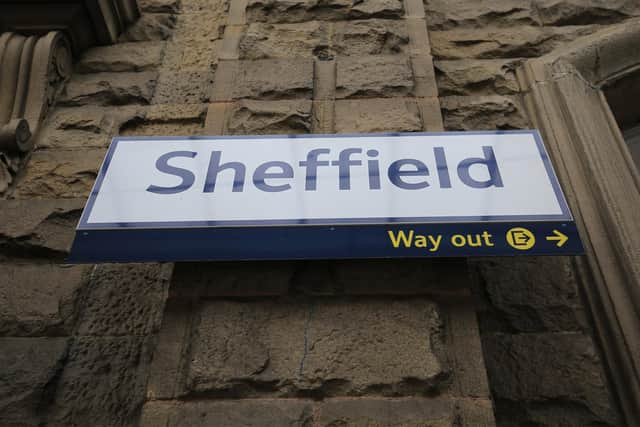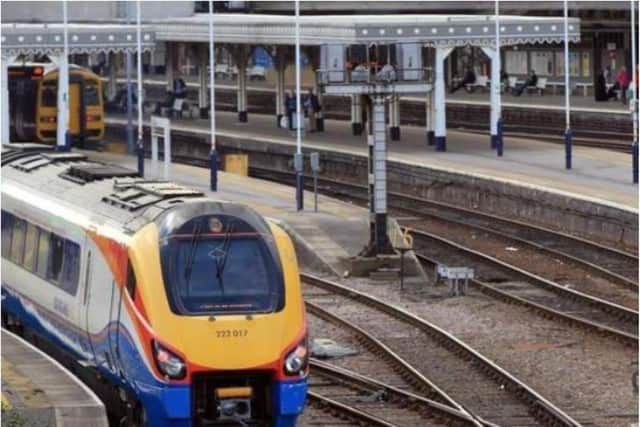Rail strike Sheffield: RMT has 'misjudged' timing of stoppage as network recovers from Covid
and live on Freeview channel 276
Peter Kennan said rail workers came through the pandemic with ‘no material job losses’ after the Treasury ploughed in £16bn to shore up its finances.
But the railways were still losing money because commuter and business trips were still down. And the industry had yet to adapt to a big rise in leisure trips.


Advertisement
Hide AdAdvertisement
Hide AdMr Kennan is private sector transport lead at South Yorkshire Local Enterprise Partnership.
He spoke out at the start of the biggest rail strike in a generation. Some 40,000 RMT members will down tools In three 24-hour walkouts, today, Thursday June 23 and Saturday 25 June in a dispute over pay and redundancies.
Why has the RMT misjudged its strike?
He said: “I think the RMT has misjudged things - but not in terms of the demand for more pay, only in terms of the timing of it. Of course, they rightly want to try to protect jobs.


“Rail workers came through the pandemic with no material job losses and HM Treasury ploughed in £16bn to shore up the railway’s finances.
Advertisement
Hide AdAdvertisement
Hide Ad“The railway is still losing money. Commuter flows and business trips are down. Leisure journeys are hugely up (in many places above pre-pandemic levels). Those leisure flows are 2 or 3 days a week though.
“Just like hotels which are busy on Fridays/Saturdays, the railway is busy at the weekend, but that does not pay the bills. The railway has been super-tanker slow in adapting to the new normal - engineering closures are still at weekends, train services on Sunday are still nothing like as frequent as on other days. That inertia and slow pace of change is something that you just would not see in the SME economy.
BUSINESS NEWS: Northern announces rail strike timetable


“HM Treasury is in charge. It has decided that the losses cannot continue. The Department for Transport has been charged with delivering the savings.
“The problem is that government departments only really understand one way of balancing books - cost cutting. They have limited understanding of the possibility of growing revenues by dynamic pricing - filling the gap by increasing the top line, not by cutting costs.
Why is the Treasury on the ‘warpath’?
Advertisement
Hide AdAdvertisement
Hide Ad“This is why it is so dangerous for the RMT. HM Treasury is on the warpath.”
“The path of confrontation they have chosen, could backfire. The lessons from history are there. Through the 1950’s to the early 1990’s we saw exactly the same approach from government - save costs, rationalise.
“Only with privatisation did we see, what some would view as “fat cats”, radically change the railway. Investment through the private sector rocketed and passenger numbers rocketed too. Pricing of fares was dynamic although captive markets like commuters were squeezed for the last drop of cash.
“Those easy days are gone. We must build a new railway based on leisure travel and against a backdrop of a new normal - more work from home (lower commuting) and the use of more digital technology for meetings (meaning less business journeys).
BUSINESS NEWS: Stagecoach ready to step in during rail strike
Advertisement
Hide AdAdvertisement
Hide Ad“The RMT must be seen to get on board with this and I am sure that they are - and undoubtedly have the interests of their members front and centre.
“At some point there must and will be further serious negotiation. If the current strike days go by and no one really notices, then the weapon of industrial action is seriously blunted and the RMT will have few new weapons to deploy, other than to dig in. That will lead to serious consequences for the industry.
“The railway must modernise. Ticketing is going digital and ticket office jobs including back office roles are under threat as a result. This is no different to any other part of society in the digital age.
“We do have a very safe railway. Safer than ever before. We want it to stay that way and maintenance jobs must not be cut if it jeopardises safety in any way. Looking back to Railtrack in the late 1990s shows us how easy it is to get complacent. Remember Hatfield? A huge rail crash caused by maintenance failures - and expecting a workforce to cover too many tasks in the time available. “Then shortly afterwards we had the Potters Bar crash in similar circumstances. Everything changed in the early 2000’s - Network Rail took over and brought maintenance in house from private contractors.”
Advertisement
Hide AdAdvertisement
Hide AdMr Kennan said it was too early to judge what it would do to South Yorkshire’s rail services but it ‘probably makes the prospect of investment less likely’.
He added: “So some of our key asks - extra Sheffield/Leeds fast trains, a rail link to Gateway East & DSA, rail reopenings, work to secure more trains to Manchester, the reinstatement of Cross Country’s pandemic suspended services - will be being negotiated against a threatening black sky over HM Treasury in London.
“We must not forget the impact of all this on the development of freight services such as intermodal flows of supermarket goods. Confidence in rail will take a knock when there are perceived to be unions or government (depending on your point of view) disrupting smooth operations and despite the huge decarbonisation opportunity we have in moving freight onto rail.”
There are about 40,000 RMT members who work on the railways in jobs such as maintaining tracks and signals, station staff and signallers. Because they are taking action, trains can't run - even though most drivers are members of a different union, Aslef, who are not on strike. There are also 10,000 RMT members in the London Underground who will strike on Tuesday.
Advertisement
Hide AdAdvertisement
Hide AdIt's expected that services will be affected right across Great Britain (Northern Ireland Railways is not involved).
While operators hope to work to a special timetable, passengers are being advised not to travel.
